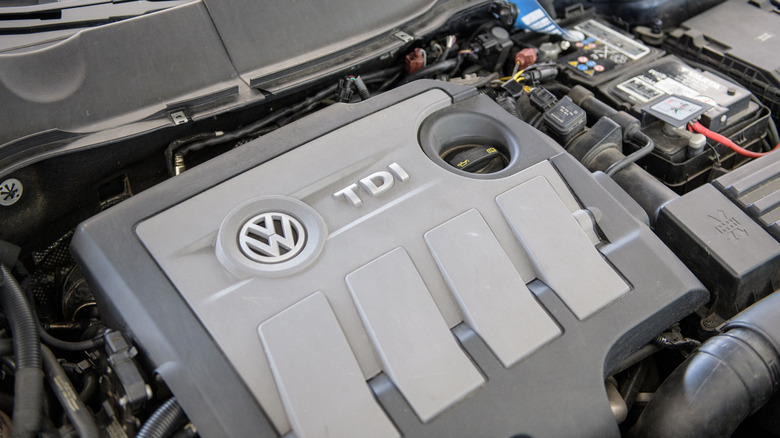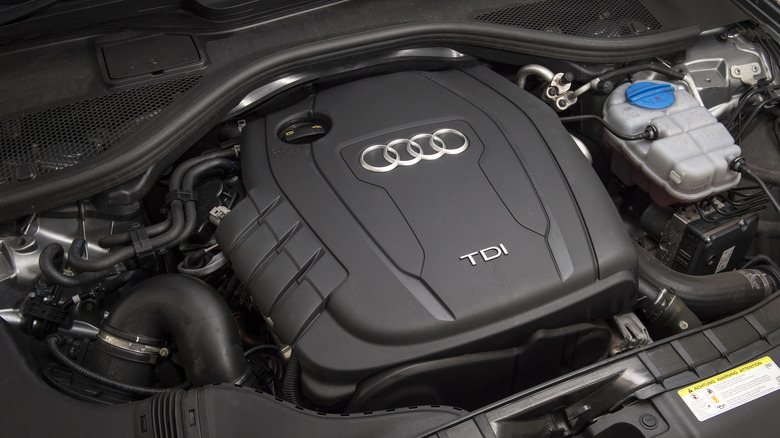What Does TDI Stand For On Diesel Cars?
Cars were the main talking point between me and the two other friends that constituted my high school posse. In fact, I can't recall having a conversation about anything else during those four fleeting years. Driver's licenses began trickling in during my sophomore year, with my eldest friend acquiring his holy laminated rectangle first. A week later, he juddered into the student lot driving a five-speed Subaru WRX, which might as well have been a Lamborghini Countach in our hormone-clouded eyes.
I was second, adopting a 300,000-mile Cactus Green Audi A4 as my weapon of choice. It didn't elicit the same response from the crowd. Luckily, I was spared by my third and youngest friend a few months later, whose first ride made us laugh so hard that we collapsed in pain on the sidewalk outside of first period. It was a Volkswagen Beetle TDI.
I'm not one to poo-poo a car, no matter the make, model, or condition. In fact, I have grown to love both Volkswagen Beetles and diesels; however, with cars being such an integral part of our identities, it was the last vehicle we were expecting to pull up that day. Almost immediately, the Beetle became our go-to vehicle to cruise in as a group, eventually gaining the nickname "The Diesel Insect" as a not-so-clever play on the TDI badge that it wore. Even being the hyper-obsessed car nerds that we were, we didn't know what TDI actually stood for. It wasn't until my friend traded in the car that we learned from a salesperson that TDI actually stands for "turbocharged direct injection."
What does turbocharged direct injection mean?
With "The Diesel Insect" being debunked as an incorrect interpretation of TDI, let's talk about what turbocharged direct injection really means. It's important first to mention that TDI is an acronym used by both Audi and Volkswagen to describe a specific subset of their diesel engines. There are two main elements to the acronym, with turbocharged representing the form of forced induction that they use and "direct injection" referencing the type of fuel injection that the engines employ.
The "T" in TDI references the fact that all of the engines in the family employ a turbocharger, which is an important part of the TDI identity. Turbochargers transform the performance of diesel engines in a very similar way to how they do in gasoline engines; they cram as much air into the cylinders as possible, allowing for increased efficiency and power.
While modern diesel engines are often more efficient than gasoline engines, early fuel injection technology limited the full potential of diesel engines. Early Volkswagen diesel engines used an indirect injection system that sprayed fuel into a pre-combustion chamber where air mixed with fuel before igniting and traveling to the rest of the cylinder. While indirect fuel injection decreased engine noise and vibration in early diesels, it limited thermal efficiency and contributed to higher emission levels compared to direct injection. In 1989, Volkswagen began using direct injection in its diesel engines, where fuel is sprayed directly into the combustion chamber at high pressure, reducing emissions while improving efficiency, fuel economy, and performance. With the help of a turbocharger, TDI engines are powerful while still benefiting from the fuel efficiency offered by direct injection. Despite their benefits, Volkswagen discontinued TDI models in the U.S. in 2016 following the Dieselgate emissions-cheating scandal, opting to focus on EVs instead.

